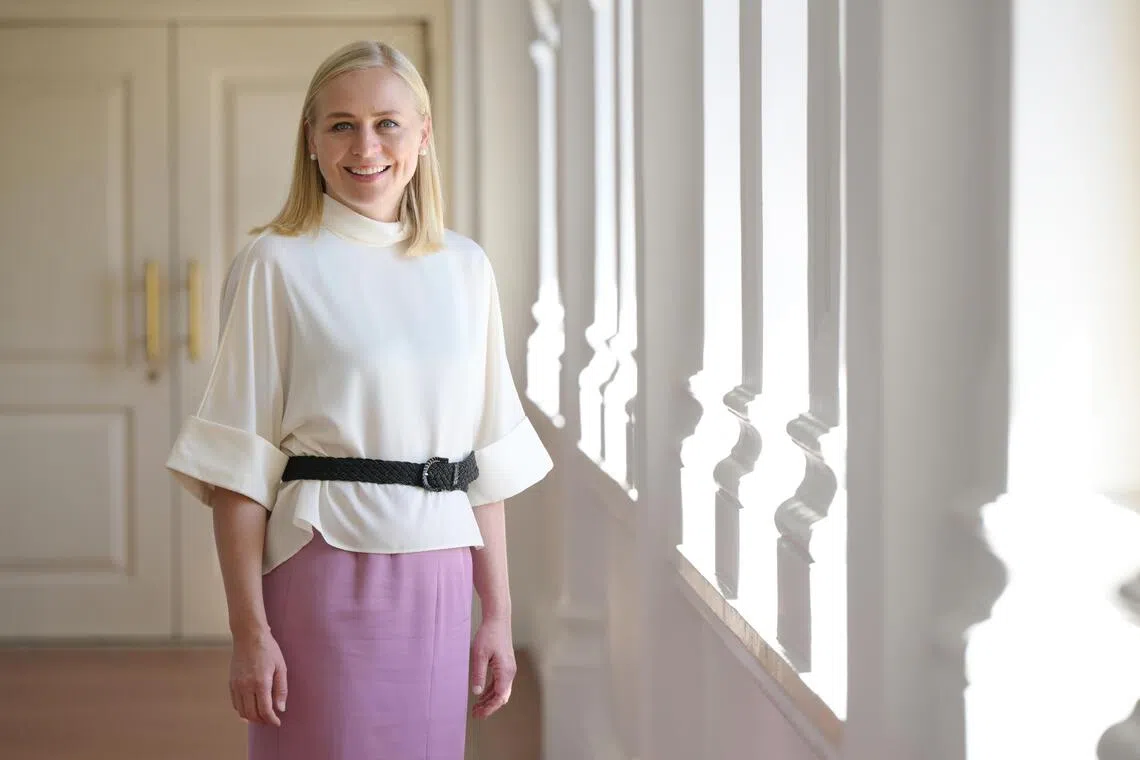Russia threat extends beyond Ukraine, says Finnish Foreign Minister
Sign up now: Get ST's newsletters delivered to your inbox

Finnish Foreign Minister Elina Valtonen on Oct 28 at Raffles Hotel, where she gave a lecture on Finland’s approach to resilience as a small state.
ST PHOTO: NG SOR LUAN
SINGAPORE – Finland’s chief diplomat has called on the “free world” to “keep pushing back” against Russia, warning that the threat posed by Moscow extends beyond its ongoing war in Ukraine.
Finnish Foreign Affairs Minister Elina Valtonen also warned of “global implications” should Ukraine be forced to cede territory to Russia to make peace
“That would wipe off 80 years of more or less peaceful history because the UN Charter specifically stipulates that a country has the full right to sovereignty and territorial integrity,” Ms Valtonen told The Straits Times in an interview on Oct 28, while on an official visit to Singapore.
She added: “(It) would just be an invitation to larger powers to use their violence and use force to move borders... Certainly not something that, for instance, the Indo-Pacific wants to see.”
Ms Valtonen’s remarks about the wider impact of the Ukraine war echoed those of Finnish Defence Minister Antti Hakkanen, who recently told The Guardian newspaper that defeating Russia’s invasion of Ukraine is critical to restraining China in the Indo-Pacific.
“Unfortunately, the case is still that Russia only understands power,” Ms Valtonen said.
“We need strength. That’s what they understand. If they see weakness somewhere, they are certainly exploiting that.”
Finland, which shares a 1,340km land border with Russia, has a bitter history of losing land to its neighbour.
In 1939, it was invaded by the Soviet Union after refusing demands for it to cede land on its eastern border in exchange for land elsewhere.
The conflict ended with Finland losing about 10 per cent of its territory, with the areas handed over to Moscow still a part of Russia today.
Ms Valtonen emphasised the heavy investments being made by Europe today in defence and deterrence, noting as well the military aid provided to Kyiv, of which Finland has contributed about €2.8 billion (S$4.2 billion).
Finland has also committed to raising its own defence budget to at least 3 per cent of its gross domestic product (GDP) by 2029, and 5 per cent by 2032, up from 2.4 per cent in 2024.
The North Atlantic Treaty Organisation, or Nato, pledged in June to collectively increase defence spending to 5 per cent of GDP by 2035.
Ms Valtonen also pointed to the numerous sanctions placed against Russia by the European Union, with an import ban on Russian liquefied natural gas from 2027 part of the latest raft of measures.
The US is now in lockstep too, she said, citing Washington’s sanctions on two of Russia’s largest oil companies
“That will be very important to weaken Russia’s war machine,” added Ms Valtonen, who has called for even more pressure to be placed on Moscow as Russia’s economic growth is widely believed to have slowed sharply in 2025 after a post-invasion high.
Beyond Ukraine, Russia has been accused of waging a “hybrid war” against its European neighbours, using alleged acts of sabotage, cyber attacks and other forms of interference as means of destabilisation.
Recent incidents include drone intrusions at European airports, airspace violations by Russian jets and the cutting of undersea cables in the Baltic Sea that have been linked to Russia, though Moscow has repeatedly denied these accusations.
Russia has also been expanding its military footprint and gaining influence in Africa, especially in the Sahel region, where countries like Burkina Faso and Mali have ejected Western troops and embraced closer security ties with Moscow.
“Indeed, Russia is not only a threat in Ukraine, but it’s a threat to many other countries and the rest of the world,” Ms Valtonen told ST when asked about Russia’s hybrid threats, which are said to have expanded significantly since 2022.
“They are causing a lot of trouble, not only in Ukraine, also in the rest of Europe. Look at what they are doing in the Sahel, in Western Africa, causing desperation, organising military coups, spreading misinformation,” she added.
While in Singapore, Ms Valtonen gave a lecture on Finland’s approach to resilience as a small state, at the Raffles Hotel on Oct 28, as part of a series organised by the International Institute for Strategic Studies.
During a subsequent question-and-answer session, Ms Valtonen was asked about Finland’s relationship with China, which she said was good, though she had some criticism for Beijing’s support of Moscow.
“If we concentrate on foreign security policy, of course, we deplore China’s intensified cooperation with Russia because Russia clearly is a military threat against us,” the minister said.
“So we hope, and we have openly asked China to use their leverage to have Russia end their illegal war. Because clearly they couldn’t be sustaining the war if it wasn’t for the strong cooperation with China.”
China has portrayed itself as a neutral party in the Ukraine conflict, but Western governments have accused Beijing of supporting Russia’s war effort by purchasing Russian oil and gas and supplying goods with both commercial and military uses, such as drones and electronic chips.
Singapore was Ms Valtonen’s final stop on a tour of South-east Asia that also included visits to Indonesia and Malaysia.
In Kuala Lumpur, she attended the 47th Asean Summit and signed Asean’s Treaty of Amity and Cooperation, a peace pact that is a prerequisite for more formal partnerships with the regional group.
“In this time, you need friends and like-minded countries more than ever, and that’s genuinely the main purpose for my trip,” Ms Valtonen said in her interview with ST.
“Asean is becoming increasingly important. From the economic perspective, from the perspective of trade and investment, this is certainly something where Finland and Europe are focusing increasingly on,” she added.
The minister, however, is well aware that her calls to defend a rules-based international order may fall on some deaf ears.
“Here, of course, it is easy because I’m meeting with like-minded countries,” she said.
“But I’m touring the world as well with this message that sustaining peace requires that we put an effort in, all of us who are interested in retaining the free world.”



